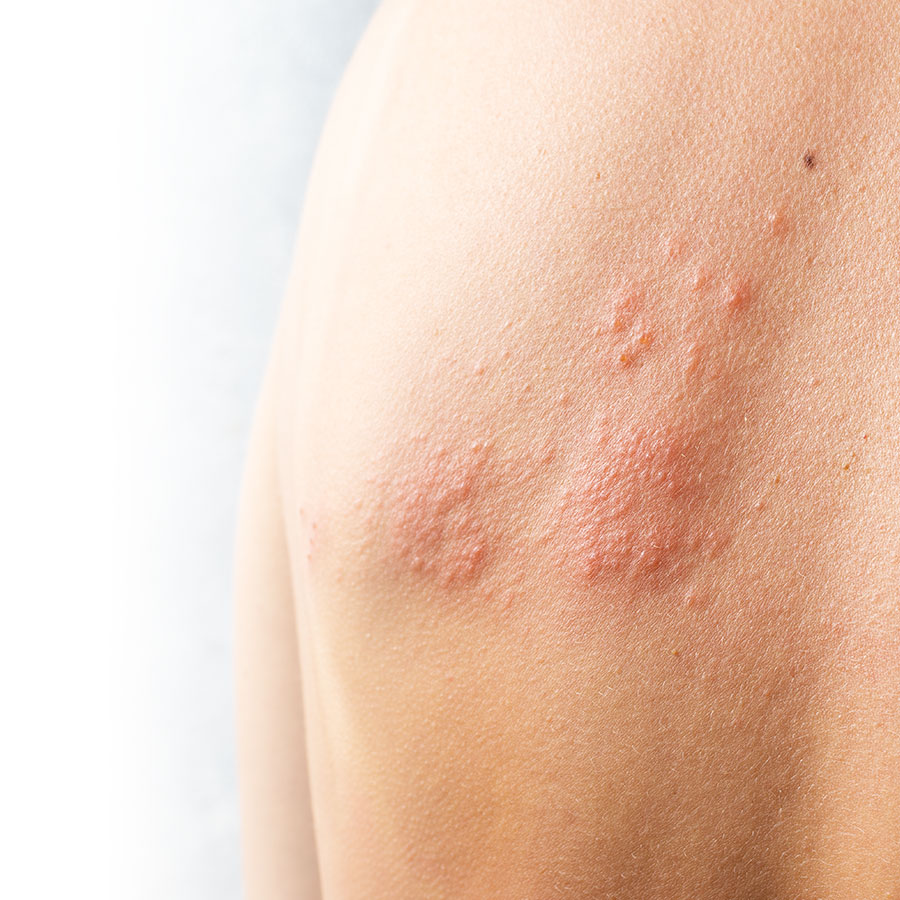Need a consultation related to the health condition discussed in this article? Schedule a pharmacy visit at a time that works for you.
Shingles can have a significant impact on the health, well-being and quality of life of those affected by it. Learn how to prevent and treat it.
WHAT CAUSES SHINGLES?
Shingles is an illness caused by the reactivation of the chickenpox virus, which has been dormant in the body.
After causing the discomfort of chickenpox, the virus fixes itself and remains in the lymph nodes, waiting for the opportunity to reactivate. Anyone who has had chickenpox can get shingles.
WHO GETS SHINGLES?
It is estimated that almost one in three people will get shingles in their lifetime. The virus is most common in people over the age of 50, who have a weakened immune system. Certain diseases (e.g., cancer), infections (e.g., HIV) and treatments (medications, chemotherapy, radiation therapy, etc.) can compromise the immune system’s defence mechanisms, which provides perfect opportunities for the virus to get the upper hand!
HOW CAN YOU RECOGNIZE SHINGLES?
Shingles can be recognized by a localized and very distinctive skin rash. Lesions appear as clustered red blisters on the skin mostly on the chest, but sometimes also appear on the back, buttocks, limbs, and even on the face or scalp.
Shingles legions may be accompanied or preceded by symptoms such as:
- tingling sensation or numbness
- intense itching
- burning sensation
- fever
- severe and debilitating pain
If left untreated, shingles lesions last an average of three weeks.
IS SHINGLES CONTAGIOUS?
Shingles is not contagious. However, the chickenpox virus is present in the fluid found in the blisters and can therefore infect a person who has never had it before.
It is important to wash your hands well to avoid contamination from one person to another. In some situations, it is wise to avoid contact. Caution is especially important for pregnant women, newborns, and people with weakened immune systems.
WHAT ARE THE CONSEQUENCES OF SHINGLES?
The most common consequence of shingles is persistent nerve pain, called “postherpetic neuralgia” or “post-zoster neuralgia.” This is due to nerve damage caused by the virus. This occurs in roughly 50% of people with shingles.
The pain is often described as an “electric shock sensation”, and is sometimes described as unbearable. It can last for weeks, months, and in some rare cases, a lifetime. The pain is sometimes accompanied by insomnia, fatigue, depression, and social withdrawal.
Other consequences of shingles are possible, but less common, such as vision or hearing loss, facial paralysis, and skin infections.
The concerning thing about shingles is its unpredictability. It is impossible to know who will or will not develop these complications after having the virus. That's why it's so important to do everything you can to prevent it, and to act quickly if symptoms occur.
HOW is SHINGLES treated?
See a doctor or pharmacist as soon as possible if you think you have shingles. Your pharmacist may, under certain conditions, start an antiviral medication to manage the infection immediately. You should still see a doctor quickly to confirm the diagnosis. Early management can reduce the intensity of the disease and its complications.
ANTIVIRALs:
These drugs treat the shingles virus. To be effective, they must be taken at the onset of the first symptoms of shingles. Their main effects are to speed up recovery, reduce acute pain, and decrease the risk of postherpetic neuralgia.
ANALGESICS (PAIN relievers):
If you experience acute pain during a shingles episode, your doctor may prescribe or suggest the use of a pain reliever.
If you have postherpetic neuralgia, the doctor may prescribe an oral, topical or injectable drug. These medications usually require a prescription.
HOW CAN SHINGLES BE PREVENTED?
Vaccination is the best protection against shingles and its complications.
Fortunately, there is a vaccine available for people aged 50 and older, and for immunocompromised adults who are at increased risk for shingles and its complications because of their weakened immune systems. This vaccine not only reduces the risk of getting shingles, but also reduces the risk of developing complications, including postherpetic neuralgia, if the virus still occurs. This is why vaccination is a key part of shingles prevention.
Depending on which province you live in, many Jean Coutu-affiliated pharmacies offer the possibility of meeting with a nurse or a pharmacist to administer the shingles vaccine.
The vaccine is now free in Quebec for certain groups of people.
Speak to your pharmacist for additional information about shingles.

